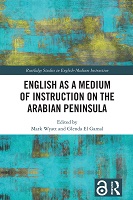Chapter 4 Language Policies and Ideologies in Qatar
Proposal review
Is Resistance to English-Medium Instruction the Right Resistance?
Abstract
Neoliberalism, globalisation, and English language hegemony have contributed to the adoption of Western “travelling policies” in the Arab Gulf states, such as building knowledge-based economies and the implementation of English-medium instruction in schools and universities. In Qatar, as well as in other Arab Gulf states like the United Arab Emirates, this has led to ideologies of English-medium instruction and Arabic-medium instruction being in competition with each other. The result of these ideologies in Qatar has been several abrupt shifts between English-medium instruction and Arabic-medium instruction in language policies for government schools and the leading national university, and other broader efforts to preserve and promote the Arabic language. This chapter first provides an overview of the macro sociolinguistic situation and the roles, status, and functions of English in Qatar. It then describes the shifts between English-medium instruction and Arabic-medium instruction in language policies and implications for cultural and linguistic identities in Qatar. Finally, the chapter reflects on Qatar’s strong resistance to EMI among the Arab Gulf states and the future of English-medium instruction and Arabic-medium instruction in the country.
Keywords
EMI, bilingual education, translanguaging, multilingualism, academic literacies, Arab Gulf statesDOI
10.4324/9781003183594-5ISBN
9781032024936, 9781032024943, 9781003183594Publisher
Taylor & FrancisPublisher website
https://taylorandfrancis.com/Publication date and place
2023Imprint
RoutledgeClassification
Education
Linguistics
Language teaching and learning


 Download
Download